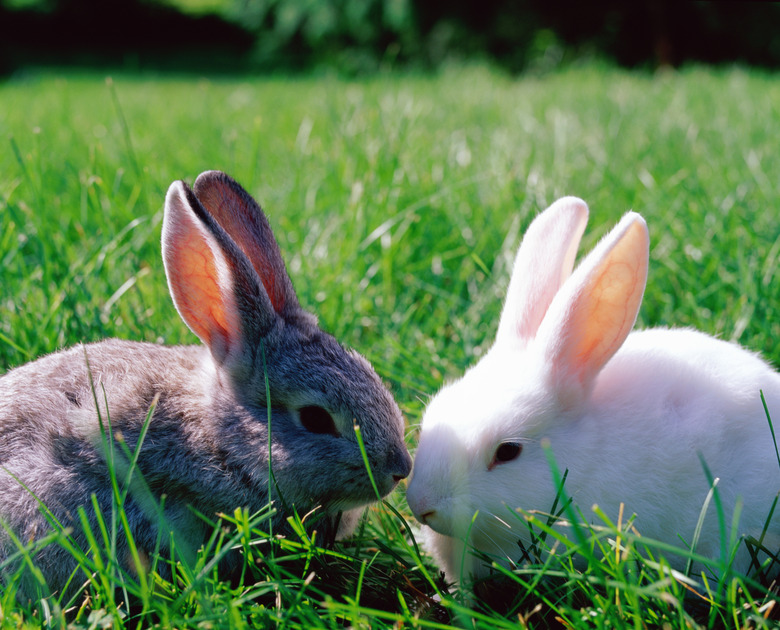How Will You Know When Your Rabbit Is In Labor?
Raising rabbits for the pet or meat market can be a productive business. Rabbit breeders know it is essential for the animals and business's health to monitor a doe's pregnancy and prepare for the birth of her young. Knowing the signs of labor in a rabbit and preparing for emergencies can lead to a successful birthing process.
Breeding
Breeding
It is important to have an active role in the breeding of the rabbit so a birth date can be calculated. Smaller breed female rabbits are ready to reproduce at 5 months, while medium-sized does should be bred for the first time when they are 6 months old. Large female rabbits are ready at 8 months. Female rabbits don't go into heat but release eggs within 13 hours after mating. Pregnancy is determined by palpating the doe's abdomen about 12 days after mating. If she is pregnant, the rabbit fetuses should feel like little grapes underneath the skin. The rabbit gestation period varies from 28 to 32 days. Larger breeds gestate longer than smaller rabbits.
Preparation
Preparation
Around the second week of her pregnancy, the female rabbit will act uncomfortable. She will spend more time laying down and resting. Her weight should also be increasing. In the fourth week, preparations need to be made for the baby rabbits, also known as kits. A nest box with cushioning material like hay or absorbent cloth should be placed in her cage on the 27th day. A few days or hours before birthing, called kindling, most females will start removing fur off their backs and bellies. This is normal, and she will line her nest box with the fur to keep the kits warm since they are born without hair. Some does will not pull their fur, and others may do it throughout their pregnancy.
Labor
Labor
At first, the doe will not spend much time in the nest box. Even when she is in labor, she will only spend 5 to 30 minutes in the box, facing the rear of the container. She must be left alone during this time. A normally sweet-natured rabbit may be grumpy and will not want to interact with people during labor. Female rabbits can give birth during the night or day, so it is important to check on them frequently during the fourth week. Every time she enters and exits the nest box, check for kits in the hay or whatever nesting material was provided.
Complications
Complications
Several problems can arise during a rabbit's pregnancy and during labor. A rabbit that goes past 35 days gestation without giving birth may not have been successfully mated. However, if the owner is sure she was pregnant either through palpation or an ultrasound, the doe should be taken to a veterinarian. The vet can give the rabbit an artificial hormone to induce labor or deliver the kits via C-section. Kits are not usually born alive after 35 days, and it is important to have the fetuses removed to prevent future infection and infertility. If a pregnancy loss occurs, evaluate the rabbit's housing and diet to see if changes need to be made. Stress from overcrowding and inadequate nutrition can cause problems for pregnant rabbits.
References
- Three Little Ladies Rabbitry; What to Expect When Your Doe is Expecting
- Three Little Ladies Rabbitry; Overdue Does and Retained Kits
- Three Little Ladies Rabbitry; Breeding Rabbits
- The Nature Trail Rabbitry; How to Determine If Your Rabbit Is Pregnant
- The Nature Trail Rabbitry; Rabbit Kindling Dates
- The Nature Trail Rabbitry; Rabbit Breeding Problems 2
